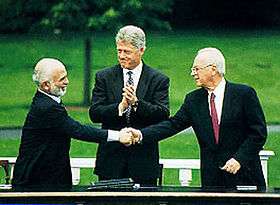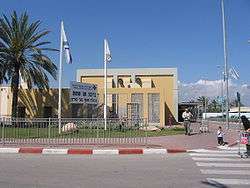Israel–Jordan relations
Israel–Jordan relations refers to the diplomatic, economic and cultural relations between Israel and Jordan. The two countries share a land border, with three border crossings: Yitzhak Rabin/Wadi Araba Crossing, Jordan River Crossing and the Allenby/King Hussein Bridge Crossing, that connects the West Bank with Jordan. The relationship between the two countries is regulated by the Israel–Jordan peace treaty in 1994, which formally ended the state of war that had existed between the two countries since the establishment of the State of Israel in 1948, and also established diplomatic relations, besides other matters. Relations between the countries get strained from time to time, usually over tensions at the Al-Aqsa mosque.[1][2]
Israel |
Jordan |
|---|---|
_-_PM_Yitzhak_Rabin_and_King_Hussein_of_Jordan.jpg)
History
1948–1994
Between 1948 and 1994, Jordan consistently followed an anti-Zionist policy, but made decisions pragmatically. Several factors are cited for this relative pragmatism, among these being the two countries' geographic proximity, King Hussein's Western orientation, and Jordan's modest territorial aspirations. Nevertheless, a state of war existed between the two countries from 1948 until the treaty was signed.
Memoirists and political analysts have identified a number of "back-channel" and at times clandestine communications between the two countries, often resulting in limited accommodations even during times of war.
Jordan was not a member of the United Nations when the vote on the United Nations Partition Plan for Palestine was taken in November 1947, but following the establishment of the state of Israel on 14 May 1948, Jordan, then known as Transjordan, was one of the Arab countries that intervened in the war. It seized control of the West Bank and East Jerusalem (including the Old City), and expelled its Jewish population, formally annexing the territories in 1950. After the Fedayeen attacks from Jordan decreased after Israel's victory in the 1956 Suez War, the tense relations between Israel and Jordan following the 1948 Arab–Israeli war eased. In the 1967 Six-Day War, Jordan aligned itself with Nasser's Egypt despite an Israeli warning, and lost the West Bank and East Jerusalem to Israel, but did not relinquish its claim to the territory until 1988. Jordan significantly reduced its military participation in the Yom Kippur War in 1973 against Israel. Jordan and Israel signed the Israel-Jordan Treaty of Peace in 1994, normalizing relations between the two countries.
In 1970 King Hussein waged the war of Black September against the Palestinian Liberation Organization (PLO), eventually ejecting the organization and thousands of Palestinians, who threatened Hussein's rule. During Black September, Syrian troops invaded the kingdom, threatening to further destabilize the regime. In response, the Israeli Air Force made a series of overflights over the Syrian forces, prompting them to return to Syria.[3] The war against the PLO factions may have strengthened the connections between Israel and Jordan. Some claim that Mossad warned Hussein about a Palestinian assassination attempt and that Hussein warned Israeli Prime Minister Golda Meir in a clandestine face-to-face meeting about Egyptian and Syrian threats prior to the 1973 Yom Kippur War. Hussein's intention was to stay out of the war.
In 1987 Israeli Foreign Affairs Minister Shimon Peres and King Hussein tried to secretly arrange a peace agreement in which Israel would concede the West Bank to Jordan. The two signed the "Peres–Hussein London Agreement", defining a framework for a Middle Eastern peace conference. The proposal was not consummated due to Israeli Prime Minister Yitzhak Shamir's objection. The following year Jordan abandoned its claim for the West Bank in favor of a peaceful resolution between Israel and the PLO.[4]
Israel-Jordan peace treaty


In 1994, Israel and Jordan negotiated a peace treaty, which was signed by Yitzhak Rabin, King Hussein and Bill Clinton in Washington, DC on 25 July 1994. The Washington Declaration says that Israel and Jordan ended the official state of enmity and would start negotiations to achieve an "end to bloodshed and sorrow" and a just and lasting peace.[5]
On 26 October 1994, Jordan and Israel signed a peace treaty, normalizing relations between them and resolving territorial disputes, including water sharing.[6] The treaty adjusted land and water disputes, and provided for broad cooperation in tourism and trade. It also included a pledge that neither Jordan nor Israel would allow its territory to become a staging ground for military strikes by a third country. The treaty was closely linked to efforts to achieve peace between Israel and the Palestinians.
Following the agreements, Israel and Jordan opened their borders. Several border-crossings were erected, allowing tourists, businessmen and workers to travel between the two countries.[7] Israeli tourists started to visit Jordan, and many foreign tourists would combine visits to both countries.
In 1996 the two countries signed a trade treaty. As part of the agreement, Israel assisted in establishing a modern medical center in Amman.
2010–present
In 2010, when the government of Jordan sought permission from international governments to produce nuclear fuel for use in Jordanian power plants, Israel objected, citing the unstable political nature of the Middle East. In light of the Israeli objection the request for United States approval was denied.[8]
In a meeting with the Centre for Israel & Jewish Affairs in Canada, Jordanian King Abdullah noted that Israel, which he recognizes as a vital regional ally, has been highly responsive to requests by Abdullah to resume direct peace talks between Israel and the Palestinian Authority.[9] Promoting peace between Israel and the Palestinian Authority is a major priority for Jordan. It supports U.S. efforts to mediate a final settlement, which it believes should be based on the 2002 Arab Peace Initiative, proposed by Saudi Arabia.[10]
On 23 July 2017, the deputy director of security of the Israeli embassy in Amman was involved in an incident.
On 22 November 2019, King Abdullah described Jordan's relations with Israel as being "at an all-time low", mostly because of domestic political issues in Israel.[11]
Economic relations
Jordan has also benefited economically from the peace treaty. As a result of the treaty, Qualified Industrial Zones were developed in Jordan. In these zones, companies that use a percentage of Israeli inputs can export duty-free to the United States. As of 2010, the zones have generated 36,000 jobs, and have become the strongest engine for Jordan's economic growth. The opposition Muslim Brotherhood movement has asked the government to shut them down, but the government maintains that the zones provide jobs for thousands of Jordanians.[12][13]
Israel has facilitated Jordanian trade with Iraq and Turkey since 2013 by allowing goods to be transported by truck via the Jordan River Crossing near Beit She'an. The goods are taken to Haifa Port and shipped from there to Iraq and Turkey.[14] Previously this trade passed overland through Syria but has been disrupted by the Syrian Civil War.
According to a 2016 agreement valued at US$10 billion, Israel will supply Jordan with 45 billion cubic meters (BCM) of natural gas over 15 years. The gas will be supplied by a new pipeline scheduled for completion by 2020 that will stretch from the Israel–Jordan border to the Arab Gas Pipeline near Mafraq.[15] The Jordanian government maintains that procuring gas from Israel will save Jordan JD700 million per year in energy costs.[16] The pipeline started its intitial 3-month operation on December 31st, 2019, despite heated protests by opposition groups. Local campaign coordinators against the deal criticised the high costs when the country is already receiving cheap liquified gas through a port in Aqaba, as well as additional electricity produced by solar power plants.[17]
References
- "Jordan: Israeli 'provocations' at Temple Mount will harm ties". Retrieved 12 November 2017.
- snjeim (18 September 2015). "Al-Aqsa incursions strain Jordan-Israel ties". Retrieved 12 November 2017.
- Migdal, Joel (2014). "4. Finding a Place in the Middle East: A New Partnership Develops out of Black September". Shifting Sands: The United States in the Middle East. Columbia University Press (published February 2014). ISBN 978-0-231-16672-0. Archived from the original on 9 December 2014. Retrieved 20 December 2014.
- Kifner, John (August 1, 1998). "Hussein surrenders claims on west bank to the P.L.O." New York Times.
- "The Washington Declaration". Israel Ministry of Foreign Affairs. July 25, 1994. Retrieved 2012-05-07.
- Susskind, Lawrence; Shafiqul Islam (2012). "Water Diplomacy: Creating Value and Building Trust in Transboundary Water Negotiations". Science & Diplomacy. 1 (3).
- Lukacs, Yehuda (12 November 1999). "Israel, Jordan, and the Peace Process". Syracuse University Press. Retrieved 12 November 2017 – via Google Books.
- Bar'el, Zvi (July 7, 2010). "Who's Afraid of the Jordanian Atom?". Haaretz.
- Jordan: Background and U.S. Relations Congressional Research Service (January 27, 2014)
- Tibon, Amir (November 23, 2019). "Relations Between Israel and Jordan at an All-time Low, King Abdullah Says" – via Haaretz.
- Jamal Halaby (April 12, 2010). "Business with Israel pays off in Jordan". Associated Press. Archived from the original on August 13, 2018. Retrieved August 12, 2018.
- David Makovsky (January 31, 2003). "Peace Pays Off for Jordan". Los Angeles Times.
- "Iraqi goods travel to Turkey via Israel". 5 April 2013. Retrieved 12 November 2017.
- Tayseer, Mohammad; Benmeleh, Yaacov (4 July 2018). "Jordan Pipeline for Israeli Gas Set for Completion by End of 2019". Bloomberg News. Retrieved 11 August 2018.
- Ghazal, Mohammad (5 July 2018). "Israeli gas to Jordan expected in 2020 — official". The Jordan Times. Retrieved 12 August 2018.
- Jordan starts getting gas from Israel despite heated opposition. Arab News. Retrieved January 3, 2020.
